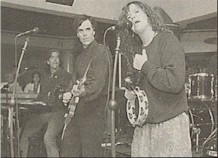'60s band to give hometown fans a taste of what made it famous
NEWPORT – The Cowsills were close to signing their musical future away, to resigning themselves to be strictly an oldies act.
“We were ready to do it,” Bob Cowsill said recently. “But the pen didn’t have any ink. Then we decided to go to a restaurant and talked about it. We weren’t going to do it unless everyone wanted to do it.”
That was a decade ago, when Dick Clark wanted to put them on the oldies circuit. They’d tour on a bus with the Grass Roots and the Turtles and would play three songs a show.
“Believe me, the money was good, really good,” Cowsill said. “And we could’ve used the money.”
But the Cowsills, four of them at that time, didn’t want to be away from their families for weeks at a stretch. And, just as important, they felt they still had some good music left in them.
This weekend, Newport’s biggest selling rock/pop band returns to their hometown for two shows at the 12th Annual Aquafina Taste of Rhode Island festival at the Newport Yachting Center.
The band will play two sets of hits and newer tunes on Saturday from 7 to 9 p.m. and on Sunday at 3:30 p.m. It’s the first time all seven members have played together on one stage.

Richard Cowsill
In the band’s late ‘60s heyday, father Bud refused to let brother Richard be in the band. Brother Bill, who lives in Canada, left the band in the early ‘70s and has not performed with his siblings in close to three decades.
“It’s going to be great, putting this all together,” said Bob Cowsill, 51, who lives in southern California. “It’s hard to get everyone out of California and Canada and New Orleans. This is like 100 times better than if we’d done this 20 years ago.”
The Cowsills’ story is legendary by now. The band began as four brothers – Bill, Bob, John and Barry – playing local gigs and releasing their own singles. Their father, Bud, a rough-and-tumble Navy man, mangaged the group and added brother Paul, mother Barbara and little sister Susan in what became the prototype for “The Partridge Family” a few years later.
| |
The band rose to fame in 1967 releasing “The Rain, the Park, and Other Things,” which went to No. 2, followed with Top 40 hits “We Can Fly,” “Indian Lake” and “Hair.” There were frequent TV appearances and commercials.
But the band crashed hard in the early ‘70s, with brother Bill leaving first. Before long, the other members scattered. “When that happened, it was like an explosion, like the beginning of time, just blown apart,” Bob Cowsill said.
And through some bad investments and financial planning, the millions the group raked in disappeared as the hit records ended. “Our funds were totally mishandled,” Cowsill said. “We came out of it without a dime.”
Bob Cowsill said his father’s management style was something of a paradox: “In the end, what brought us to the top eventually brought us to the bottom.”
In 1990, the Cowsills returned to Newport for shows at the Marriott and the Newport Elks Club. The band at that time was Bob, John, Paul and Susan, with brother Barry sitting in as a sideman.
And the group pushed to find a record label for their new material. In 1998, with no major label interest, the four Cowsills released “Global” on their own Robin Records, available through the Cowsills Website.
The CD is a strong collection of guitar-based power pop, not a far cry from the Beatles-flavored sound the Cowsill brothers fell in love with in the mid-1960s. “There are so many possibilities now with the Internet,” Cowsill said. “It’s changing music in a lot of ways.”
Cowsill, the father of five kids, ages 13 to 28, makes his living working with emergency room technology. But he’s played weekly gigs at the Pickwick Pub for 17 years. He and second wife, Mary Jo, wrote all the material on “Global.”
“I’ve been lucky in that I have wonderful kids,” he said.

Members of the Cowsills rock the stage at the Newport Marriott in this 1990 photo.
Barbara Cowsill died in 1985 and Bud, who moved to Mexico in his last years, died in the early 1990s. Bob Cowsill said he had no relationship with his father, who has described as a tyrant, toward the end.
“He moved down to Mexico and has some issues to resolve,” Cowsill said. “He didn’t have much of a relationship with any of us.”
|











